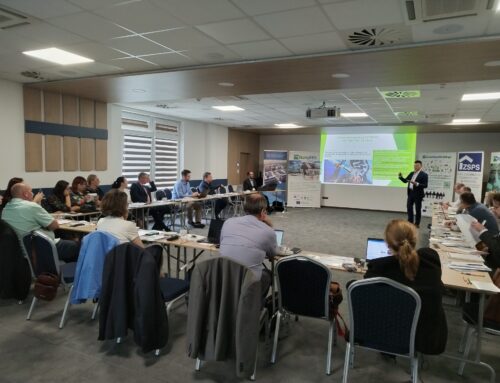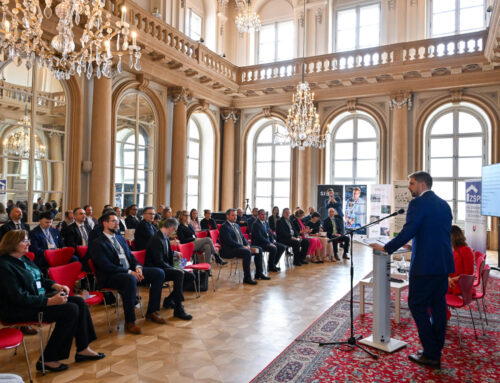The eighth meeting of the Slovak Round Table was held on 29 June 2023 at the Association of Construction Entrepreneurs of Slovakia in Bratislava. This meeting summarized the past 4 joint workshops of expert groups, which focused on different topics. The eighth meeting aimed to present the actions agreed at these workshops and to present a comprehensive package of proposals for 4 roadmaps for: residential, non-residential, industrial buildings and urban infrastructure.
During the meeting, the main idea of the Green Deal for Buildings project was highlighted, namely to find a consensus among stakeholders on the direction of Slovakia in the given topics and to spark discussion on some progressive, but also controversial topics. The project brings ideas and measures that are already established in developed countries, even commonplace, so the practice that the project brings is already proven, it just needs to be adapted to the conditions of Slovakia.
In the section on apartment buildings, the idea of prohibiting the construction of gas connections for new apartment buildings resounded. From the banks’ side, two themes were expressed that concern them in the renovation of buildings, namely the unavailability of energy certificates for taxonomy and ESG credit assessment and the lack of awareness of ESG and sustainability. In the renovation of residential buildings, there is a risk that grants and loans from EU funds will not be available in the next 10-15 years, as is already the case with the construction of road infrastructure, which is not green according to the EU Taxonomy. Slovakia will then have to rely on internal sources of funding. On the topic of rental housing, a positive approach prevailed, stakeholders agreed that it is necessary to develop it and build rental apartments, but currently it is not financially worthwhile for developers and municipalities to build them. It is also a huge bureaucratic and procedural burden for municipalities. The subsequent maintenance and possible renovation of the buildings is also a big question mark for them. There is a lack of literacy among local government officials.
The meeting also addressed the topic of the renovation of public buildings, in particular the issue of public procurement and the quality of the work carried out. There is a need for a change in the mindset of contracting authorities, to use innovative forms of procurement and consequently innovative forms of financing, in particular financial blending. As regards the quality of work, there is a need to create a social demand for skilled workers, to improve the cross-fertilisation of skills and the overall education of craftsmen.
Under the topic of industrial buildings, the importance of the role of businesses in energy communities was highlighted in the discussion. Businesses can bring the necessary economic know-how that people often do not have.
The theme of the last part was e-mobility and positive energy districts. Stakeholders agreed that both topics need to be developed.
Housing renovation measures (conclusions of the workshop discussion of 26 January 2023):
The first part was led by Jozef Plško from PSS and dealt with topics and measures :
- National plan for financing sustainability in the housing sector;
- Rental housing development;
- Plurality of housing financing;
- Legal certainty for green procurement in housing renovation.
Jozef Plško described in detail the wording of the proposed measures, on which a discussion followed:
- The discussion was triggered by the proposed point to restrict the connection of new residential houses to gas and the construction of gas connections as in other EU countries. This is linked to the withdrawal from fossil fuels as well as the impacts on the health of the population. The aim of the measure is to trigger a debate on the subject and to analyse what the impact would be. Slovakia is one of the most gasified countries in the EU, therefore it could be problematic and challenging to ensure gas substitution in residential buildings in Slovakia.
- Mr Maxim contributed to the discussion on behalf of the Slovak Banking Association. Currently, two main topics could be identified, which we are addressing at the SBA in the context of sustainability:
- Unavailability of energy certificates – for assessing loans according to the ESG taxonomy, banks would very much need access to energy certificates to be able to assess the loans provided for renovation and refurbishment. Unfortunately, currently banks do not have access to a national database of these certificates, this database is not complete and even the existing certificates are not in a form that is suitable for use.
- ESG and sustainability education – there is a lack of awareness in the market about the ESG taxonomy and the requirements that are, or will shortly be, placed on many companies.
As far as rental housing is concerned, the general mentality in Slovakia is that people want to own a flat and not live in a rental.
State-subsidised support for rental housing – the response was around 14 000 applicants, so the claim that 200 000 flats are needed is not true. The interest from the ZMOS and towns and municipalities is rather negative – the construction of rental flats brings more complications than benefits.
There is not much interest from developers either. If the state wants to support a legal entity (PO), the calculation of minimum aid for PO enters into it, which makes it impossible for it to get a favourable interest rate or grant aid. They can get a loan from a commercial bank where the interest is high, which is not worthwhile for developers, they would have to set the rent high to maintain cash flow.
Renovation of housing – prefabricated houses renovated up to 70%, SFRB also finances the renovation. However, people are already indebted for 20 years and cannot increase the repair fund to take a new loan. SFRB interviews show that at the same time the apartment complexes are not very interested in renewables, they are more interested in insulation.
Financing of the renovation to be directed to residental houses and individual apartment buildings and the conversion of existing unused buildings into rental apartments, which is a question for the municipality because it must procure and mainly operate, which is problematic because the law provides to set the rent max. 5% of the purchase price of the apartment. The return is very low and over time there will be a higher cost of operation and renovation, which they must already finance from their own resources.
More support should be given to the disadvantaged, not the rich, in the renovation of buildings. By not solving the problems of housing renovation, we are losing time and competitiveness, and we will also lose EU funds intended for the renovation of buildings, as is the case with the construction of roads and motorways, when in the future it will no longer be possible to finance road infrastructure because it is not green. It will only be possible to finance it from national resources. The same will happen in the future with the renovation of buildings.
However, rental housing has a perspective. There is a lack of strategy, especially for young people. If we offer young people subsidised housing, it will increase interest in rental housing and in studying in Slovakia. Local authorities should also work with businesses that want to do business in their area and support accommodation for their workers.
- The mentality is important – Slovaks are afraid that if they don’t own a home, they will have a hard time finding a place to live. It is necessary to create confidence in rental housing and especially to create a feeling in people that they will not have a problem to find housing.
- Local governments should have land available where rental apartments could be built and not sold off to private developers.
- There is a lack of literacy among mayors and officials on how to take care of rental housing, how to build it, how to procure the construction, and how to set housing conditions.
- They should re-establish an investor-management company in which the municipality has a stake and takes care of the construction and management of rental housing.
- Increase the use of EIB grants and loans.
The measures have been approved by the stakeholders.
Measures for the renovation of non-residential buildings(conclusions of the workshop discussion on 2 March 2023):
- Mr Kováčik introduced the issue of renovation of public buildings and the issue of public procurement. Among the biggest problems of public procurement he identified insufficient staff capacity, unprofessionalism, alibism, goldplating and bureaucracy. A change in the mindset of procurers is necessary. Not utilizing various innovative forms of procurement is a problem. Also not using innovative forms of financing such as financial blending. Now there is only a system of either Euro funds or nothing.
- The quality of construction is also decreasing because it is done by people without a certificate of education, ignoring the requirements for quality improvement. We need cross-skills, multiprocessing of renovation contractors. There is not even a social order for increased qualification of craftsmen. There is a huge problem on the market to find people with at least basic cross-skills and knowledge. How to involve the experience of ESCO companies?
- On the topic of one-stop-shop, a request was made for the integration of counselling centres. Mr. Laktiš explained the intention to develop regional sustainable energy centres, which will be implemented by SIEA within the national project Capacities for Regions. The requirement for quality databases was also expressed, which is also one of the objectives of this national project.
- There is a lack of perspective and continuity in the renovation of public buildings and the setting up of subsidy schemes.
- Mr. Doctor – One stop shop – it is not meant to be one of the other consultancy centresit, it should be seen as a project oriented centre that should do everything up to the signing of the contracts for the implementation of the projects. A team will be set up, projects will be specified, collaborations will be made with those services that also exist in Europe. It could be for a city, a region or a county.
The measures have been approved by the stakeholders.
Measures for the renovation of Industrial Buildings (conclusions of the workshop discussion on 27 April 2023):
František Doktor from the ViaEuropa Competence centre presented the measures that came out of the workshop on industrial buildings. The topics were:
- Cooperation of companies in the field of increasing energy efficiency and the use of renewable energy sources in companies;
- Refining the conditions for industrial energy communities;
- Abolition of the exemption from the EU taxonomy for EU member state governments.
Discussion:
Laktiš from SIEA added that the role of companies in the EC is very substantial. The composition of the members is important with regard to the consumption of energy produced and shared during the day. Their role is also a business one. Companies can better set up the business model, they can deliver know how and experience from the sphere of economics. Without a good business model, the EC can very quickly disappear, which can lead to a deterioration of the reputation of the energy community concept. The biogas plant Borcova, which heats the village – there must be a good project for it.
The measures have been approved by the stakeholders.
Measures on e-mobility (conclusions of the workshop discussion on 27 April 2023):
In the last part Stanislav Laktiš from the Slovak Innovation and Energy Agency explained 3 measures related to the following topics:
- Sustainable mobility plans;
- New requirements for urban infrastructure and non-urban road infrastructure;
- Developing Positive Energy Districts (PEDs);
Participants agreed that the promotion of electromobility is necessary and indispensable. Therefore, the proposed measures were approved.






